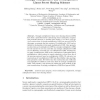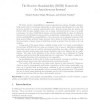310 search results - page 56 / 62 » An Efficient Protocol for Fair Secure Two-Party Computation |
104
Voted
IJISEC
2010
14 years 9 months ago
2010
We propose a generalization of Paillier's probabilistic public key system, in which the expansion factor is reduced and which allows to adjust the block length of the scheme e...
118
click to vote
PERCOM
2009
ACM
15 years 6 months ago
2009
ACM
—Privacy protection is increasingly important during authentications in Radio Frequency Identification (RFID) systems. In order to achieve high-speed authentication in largescale...
ASIACRYPT
2008
Springer
15 years 1 months ago
2008
Springer
Strongly multiplicative linear secret sharing schemes (LSSS) have been a powerful tool for constructing secure multi-party computation protocols. However, it remains open whether o...
101
click to vote
INFOCOM
2005
IEEE
15 years 5 months ago
2005
IEEE
— Current computing systems depend on adaptation mechanisms to ensure that they remain in quiescent operating regions. These regions are often defined using efficiency, fairnes...
112
click to vote
IANDC
2007
14 years 11 months ago
2007
We define reactive simulatability for general asynchronous systems. Roughly, simulatability means that a real system implements an ideal system (specification) in a way that pre...


